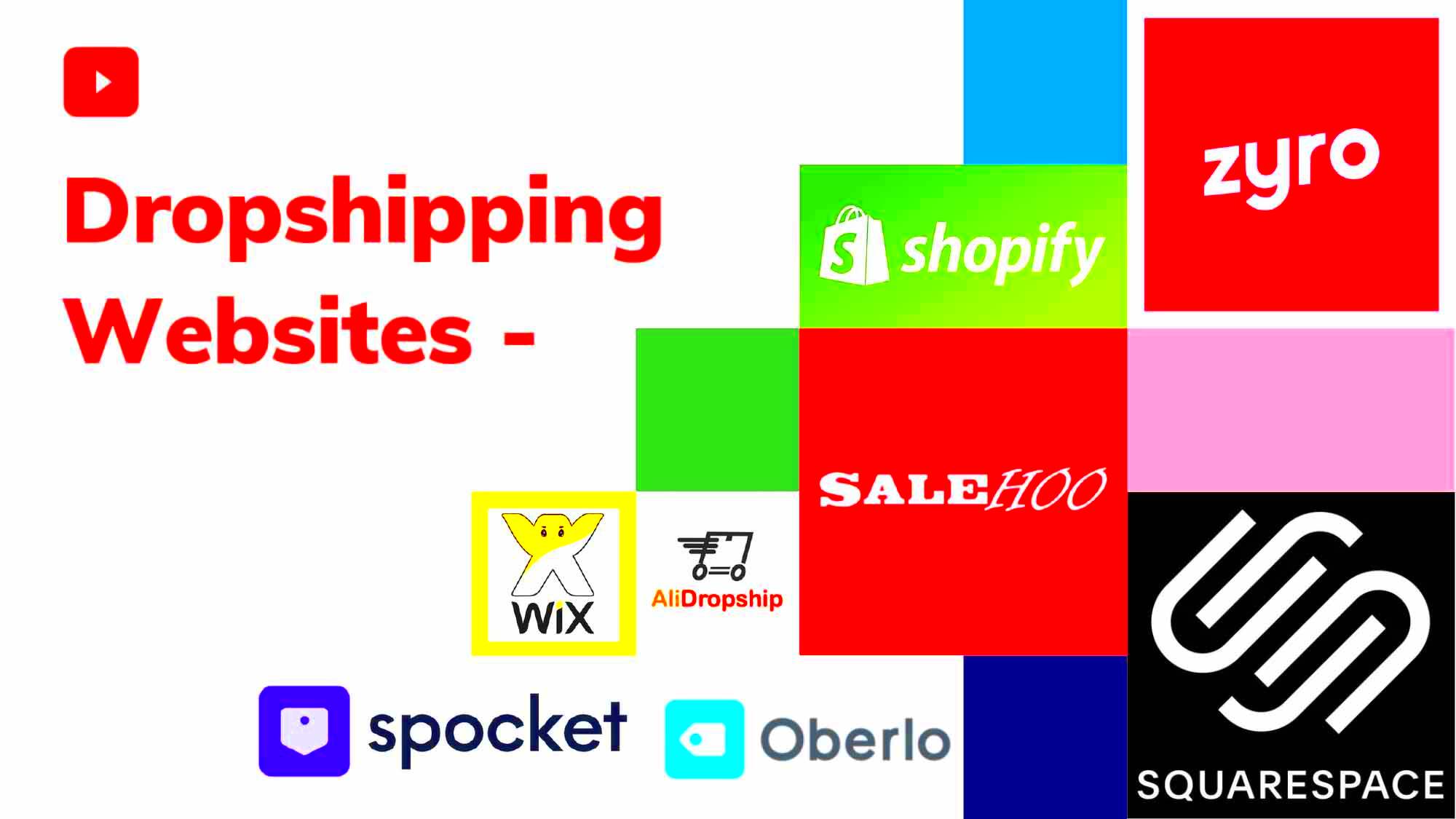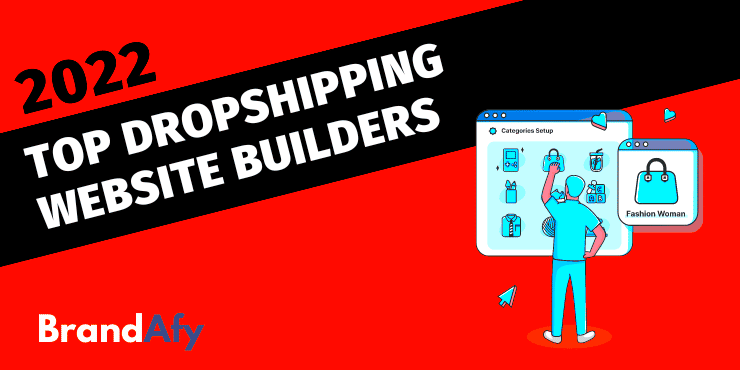In today’s digital landscape, establishing an online presence is vital for dropshipping and small businesses. With a plethora of options available, selecting the right tools is crucial for success. Dropshipping eliminates the need for inventory, allowing entrepreneurs to focus on marketing and customer service. Small businesses, on the other hand, require a robust online platform to showcase their products and connect with potential customers. The right website builder can streamline this process, offering a cost-effective and user-friendly solution that caters to both models.
What to Look for in a Website Builder

When choosing a website builder—especially for dropshipping or a small business—certain features can make a significant difference in your success. Here are some key aspects to consider:
- User-Friendly Interface: It’s essential for the platform to be easy to navigate, even for those with little to no tech experience. Look for drag-and-drop functionality and helpful tutorials.
- Pricing and Plans: As a small business owner or dropshipper, you want a builder that fits your budget. Compare pricing, but keep an eye on hidden fees or transaction costs.
- Customizability: Look for templates that you can easily modify to reflect your brand’s identity. A flexible design allows you to stand out from the competition.
- eCommerce Features: Ensure the platform supports eCommerce functionalities, such as inventory management, payment gateway integration, and shipping options.
- SEO Tools: A website’s visibility on search engines is crucial. Look for built-in SEO tools that help you optimize your content for better rankings.
- Customer Support: When issues arise, you’ll want quick assistance. Check for 24/7 support, live chat options, and an extensive knowledge base.
By focusing on these elements, you can select a website builder that meets your dropshipping or small business needs effectively.
Top Cheapest Website Builders for Dropshipping

When it comes to establishing an online presence for your dropshipping business, selecting the right website builder is crucial. You want something that’s not only budget-friendly but also packed with features that facilitate smooth and efficient operations. Here’s a roundup of some of the cheapest website builders specifically tailored for dropshipping:
- Shopify:
Starting at just $29 per month, Shopify is a powerhouse in the e-commerce realm, offering an array of tools that make dropshipping a breeze. It integrates seamlessly with various dropshipping apps, allowing you to automate much of your inventory management. The user-friendly interface and customizable themes make it an excellent choice for newcomers.
- Wix:
With plans starting at $23 per month, Wix provides a visually appealing platform with drag-and-drop functionality. While it might not be as robust as Shopify in the dropshipping space, it pairs well with third-party dropshipping apps, giving you the flexibility to manage your store effortlessly.
- Big Cartel:
For small operations, Big Cartel is a cost-effective option starting at $9.99 per month. While it’s best suited for artists and makers, it can be adapted for dropshipping with the right integrations. It’s straightforward, making it ideal for those just dipping their toes in e-commerce.
- Weebly:
Weebly’s e-commerce plans start at $12 per month, offering an easy setup process and intuitive design tools. While its built-in dropshipping features might be limited compared to others, you can connect to apps like Printful to broaden your product offerings.
Choosing the right website builder can influence your dropshipping success, so always consider not just the price but the features that align with your business vision!
Comparison of Features and Pricing
Understanding the features and pricing of website builders will help you make an informed choice for your dropshipping business. Below is a comparison table that dives into pricing tiers, features, and pros and cons of each platform:
| Website Builder | Starting Price | Key Features | Pros | Cons |
|---|---|---|---|---|
| Shopify | $29/month | Robust e-commerce tools, App integrations, SEO features |
|
|
| Wix | $23/month | Drag-and-drop editor, App integrations, Mobile optimization |
|
|
| Big Cartel | $9.99/month | Simple store management, Basic analytics, Limited products |
|
|
| Weebly | $12/month | Drag-and-drop builder, Basic SEO tools, E-commerce features |
|
|
This comparison should give you a clearer picture of what each website builder offers. Don’t forget to consider your specific needs and how each platform aligns with your business goals!
Free Trials and Plans
When it comes to selecting a website builder for your dropshipping or small business, one of the biggest attractions is the free trials and plans that many platforms offer. These trials allow you to dip your toes in the water without committing financially, which is essential for small business owners on tight budgets.
Most website builders provide limited-time free trials lasting anywhere from 7 to 30 days. During this period, you get access to various features, enabling you to assess whether the platform meets your needs. Here’s a quick rundown of what to expect:
- No Credit Card Required: Some builders, like Wix and Shopify, allow you to sign up for a free trial without entering any payment information. This is great for testing without the risk of unwanted charges.
- Feature Limitations: Free plans often come with reduced functionality. For example, you might not have access to premium templates or specific payment gateways.
- Branding Restrictions: Many free versions include the platform’s branding on your site, which can be a downside if you’re looking for a professional touch.
In addition to free trials, some builders offer free forever plans, like WordPress.com. However, they usually have stricter limitations regarding storage and customization. It’s wise to take full advantage of these trials to explore various templates, try out the customer support, and see how easily you can build pages that resonate with your target audience.
Ultimately, taking the time to explore free trials can save you both money and hassle down the line—ensuring you choose a builder that works for you and your business model.
Best Practices for Using a Website Builder
Using a website builder can be a game-changer for your dropshipping or small business, but to get the most out of it, there are some best practices to keep in mind. Following these tips will help ensure that you not only create a stunning site but also optimize it for conversions and user experience.
- Choose the Right Template: Templates set the tone for your site. Pick one that aligns with your brand identity and offers a user-friendly layout. Avoid overly complex designs that may confuse visitors.
- Optimize for Mobile: With a significant portion of web traffic coming from mobile devices, ensure your site is mobile responsive. Most builders offer mobile-friendly templates, but double-check that everything looks good on smaller screens.
- Focus on SEO: Don’t just build a great-looking site—make it findable. Use the builder’s built-in SEO tools to optimize your content with relevant keywords, meta descriptions, and alt text for images.
- Integrate Payment Solutions: For dropshipping, it’s crucial to have seamless payment gateways in place. Ensure that your website builder supports popular payment options like PayPal, Stripe, or credit cards.
- Regularly Update Content: Keep your site fresh and engaging by regularly updating your content, product listings, and blogs. This not only helps with SEO but also keeps your audience coming back.
By implementing these best practices, you’ll create a compelling, effective website that resonates with your visitors and drives sales. So, take your time, do your research, and don’t hesitate to experiment as you craft your online presence!
7. Case Studies: Successful Dropshipping Websites
Understanding the journey of successful dropshipping websites can provide invaluable insights for entrepreneurs and small business owners. Here, we’ll take a closer look at a few case studies showcasing how different businesses leveraged affordable website builders to thrive in the dropshipping arena.
1. Trendy Apparel
Trendy Apparel began as a small online shop focused on streetwear fashion. Using a budget-friendly website builder, they managed to create an attractive platform that resonated with their audience. By focusing on dynamic product visuals and user-friendly navigation, they achieved a higher conversion rate. Within the first year, Trendy Apparel reported a revenue increase of 150%!
2. Home Essentials Hub
This dropshipping store concentrated on home improvement products. By utilizing a simple drag-and-drop website builder, they were able to set up their shop in less than a week. They incorporated SEO techniques and started blogging about home tips, which significantly drove traffic. Within six months, the business turned a profit and now boasts a loyal customer base.
3. Gadget Wonders
Gadget Wonders specializes in tech gadgets and accessories. They opted for a multi-channel marketing approach, promoting their site across social media and email campaigns. By using an affordable website builder that allowed easy integration with apps, they streamlined their operations. As a result, their monthly sales skyrocketed by over 200% within eight months.
These case studies illustrate that no matter the budget, it’s possible to build a successful dropshipping website. The key elements often include a focus on user experience, effective marketing strategies, and leveraging the right tools to automate and streamline operations.
8. Conclusion: Choosing the Right Website Builder for Your Business
When it comes to selecting the perfect website builder for your dropshipping or small business, there are several factors to take into account. With so many options available, it can feel overwhelming— but don’t fret! Here’s a simple guide to help you make that choice.
1. Budget
What is your budget? Before anything else, clearly define how much you are willing to spend on a website builder. Fortunately, there are many affordable options that offer great features.
2. Ease of Use
Choose a platform that is user-friendly, especially if you’re new to website building. Ideally, look for drag-and-drop functionality that requires no coding skills.
3. Features and Integrations
Does the website builder offer the features you need? Check for essential integrations like payment gateways, email marketing tools, and social media connectivity.
4. Customer Support
If things go awry, you’ll want to know help is just a click away. Opting for a platform with excellent customer support can save you lots of headaches.
5. Scalability
Consider the long-term vision for your business. Choose a builder that can grow with your needs, allowing you to add more features as your business expands.
In conclusion, choosing the right website builder is a critical step for your dropshipping or small business. By considering your specific needs and using the right resources, you can build an effective online presence that sets you up for success!



